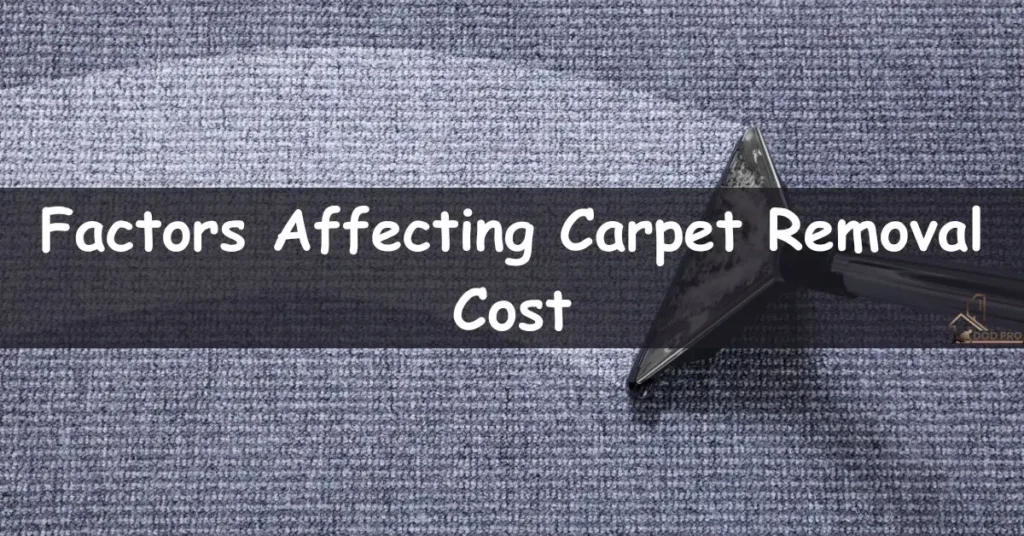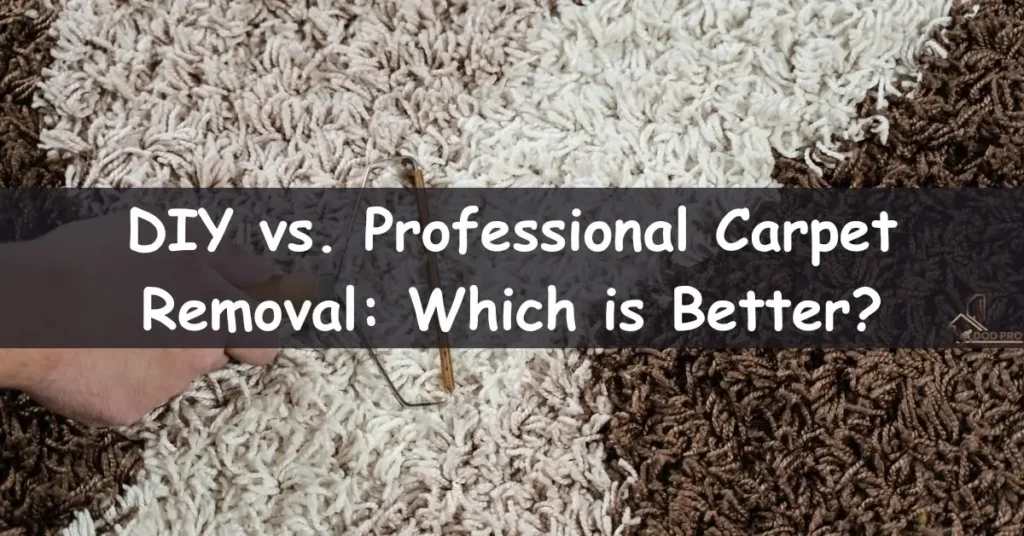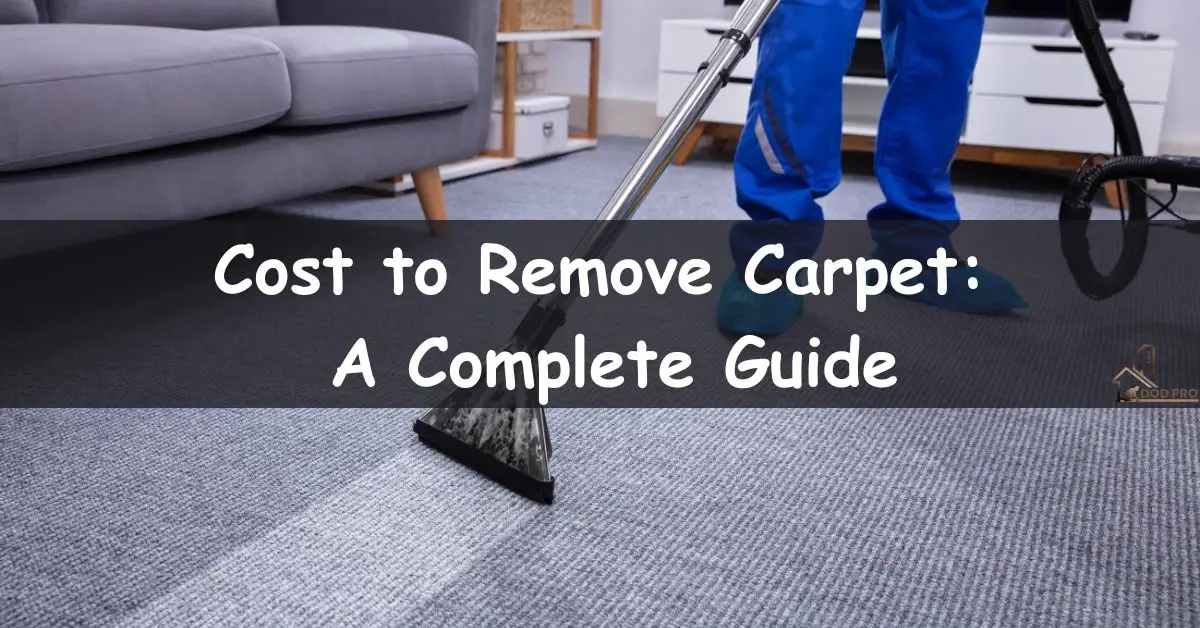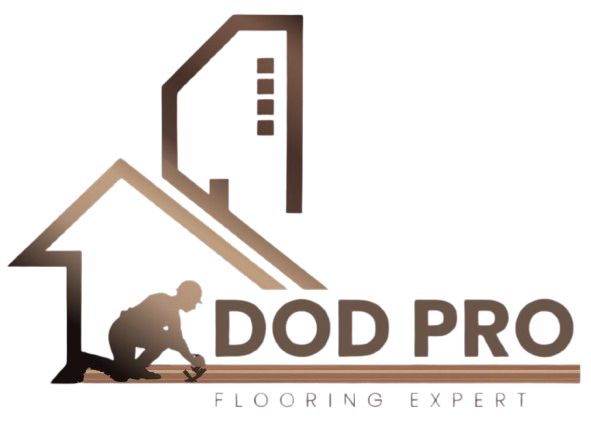The cost to remove carpet is an important factor to consider when upgrading your flooring. Whether you’re replacing old carpet with hardwood, tile, or a fresh new carpet, knowing what to expect can help you budget effectively. Carpet removal involves more than just pulling it up—it includes labor, disposal fees, and potential subfloor repairs.
In this guide, we’ll break down the carpet removal cost, what affects pricing, and whether DIY or professional removal is the best choice. By the end, you’ll have a clear understanding of how much you should expect to spend and ways to save money on the process.
Wondering if you can install carpet over tile? Click here to learn more!
How Much Does It Cost to Remove Carpet?
The cost to remove carpet varies based on several factors, such as the size of the area, labor charges, and disposal fees. On average, homeowners spend $1 to $3 per square foot for professional carpet removal. If you remove it yourself, you can save on labor costs but still need to cover disposal fees.
Here’s a breakdown of carpet removal prices based on square footage:
- Small room (200 sq. ft.) – $100 to $600
- Medium room (500 sq. ft.) – $250 to $1,500
- Large room (1,000 sq. ft.) – $500 to $3,000
If there’s extra work involved, such as removing glued-down carpet or fixing subfloor damage, costs may go up.
Factors Affecting Carpet Removal Cost

Several factors impact how much does carpet removal costs. Here are the main ones:
Size of the Area
The bigger the space, the higher the cost. Most companies charge per square foot, so removing carpet from a larger area will cost more.
Type of Carpet
Thicker or heavily glued carpets are harder to remove, increasing labor time and cost.
Condition of the Subfloor
If the subfloor is damaged, you may need repairs before installing new flooring. This adds extra costs.
Labor Costs
Hiring a professional carpet removal service costs more than DIY removal, but it saves time and effort.
Carpet Disposal Fees
Once the carpet is removed, it needs to be disposed of properly. Some areas charge disposal fees, ranging from $0.50 to $1 per square foot.
DIY vs. Professional Carpet Removal: Which is Better?

If you’re handy, you might consider removing the carpet yourself to save money. However, it’s important to weigh the pros and cons before making a decision.
DIY Carpet Removal
Removing the carpet yourself can save you a significant amount of money since labor costs make up a large portion of the overall carpet removal prices. You can also work at your own pace and avoid scheduling issues with contractors.
However, the process can be time-consuming and physically demanding. You’ll need tools like a utility knife, pliers, and a pry bar to get the job done. Additionally, disposing of old carpet can be a hassle, as some areas have strict disposal rules.
Professional Carpet Removal
Hiring a carpet removal service ensures a quick and efficient process. Professionals have the right tools and experience to handle carpet removal without damaging the subfloor. They also take care of disposal, which saves you the trouble of finding a suitable landfill or recycling center.
The downside is that professional services can be costly. Prices vary based on location and job complexity, but they typically charge $1 to $3 per square foot. If you’re on a tight budget, getting multiple quotes can help you find the best deal.
How to Save Money on Carpet Removal
Want to reduce the cost to tear out carpet? Here are some tips:
Remove the Carpet Yourself
One of the easiest ways to save money is to remove the carpet yourself and only hire a professional for disposal. By doing so, you eliminate labor costs, which can add up quickly, especially for large areas.
Compare Multiple Quotes
If you decide to hire a carpet removal service, get quotes from at least three different contractors. This helps you find the best price while ensuring quality service. Be sure to check customer reviews before making a decision.
Check for Hidden Fees
Some companies charge extra for disposal or moving furniture. Before hiring a contractor, ask for a detailed estimate that includes all potential fees. This prevents unexpected costs from appearing on your final bill.
Recycle or Donate Old Carpet
Instead of paying for disposal, check if your old carpet can be recycled or donated. Some recycling centers accept used carpet, and charities may take it if it’s still in good condition. This not only saves money but also benefits the environment.
Conclusion
The cost to remove carpet depends on factors like room size, labor, and disposal fees. Doing it yourself can save money, but it takes time and effort. Hiring a professional is easier but costs more.
To keep expenses low, compare prices, check for hidden fees, and see if you can recycle the old carpet. With the right plan, you can remove your carpet smoothly and stay within budget.
FAQs
Q1: How much does it cost to rip up carpet?
A: The cost ranges from $1 to $3 per square foot, depending on labor and disposal fees. Prices may be higher if the carpet is glued down or if additional work, like subfloor repairs, is needed. Getting multiple quotes from professionals can help you find the best deal.
Q2: Is carpet removal messy?
A: Yes, it can be dusty and may expose old debris. Wearing a mask and gloves is recommended. If the carpet has been in place for a long time, you might find mold, dust, or allergens underneath. Proper ventilation and cleanup will help minimize mess and health risks.
Q3: Can I remove glued-down carpet myself?
A: Yes, but it requires extra effort. You’ll need a scraper, adhesive remover, and patience. The process can be time-consuming, especially if the glue is strong. Renting a floor scraper or heat gun can make the job easier and speed up removal.
Q4: How much does carpet disposal cost?
A: Disposal fees vary by location but typically cost $0.50 to $1 per square foot. Some waste facilities charge by weight, so costs may increase for heavier carpets. Check if your local recycling center accepts old carpets to reduce disposal costs.


